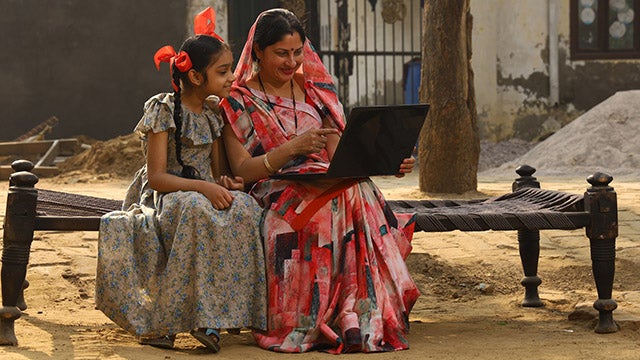Afghanistan Minister of Health Dr. Suraya Dalil at the 2014 Resolve Award ceremony.
Each year, the Resolve Award is presented to country governments for their leadership and innovative reproductive health policy development and service delivery at a ceremony during the annual Geneva Policy Dialogue Series for Reproductive Health event held at the time of the World Health Assembly. Given by the Aspen Institute Global Leaders Council for Reproductive Health (GLC), this year’s Award went to Tanzania and Peru to honor those countries’ work to meet the needs of adolescent girls. Afghanistan and Cambodia received special mentions for their efforts.
Afghanistan Minister of Health Dr. Suraya Dalil is tackling high maternal mortality rates and reproductive health challenges through bold policy and programming innovations. She dedicated the 2014 Resolve Award to the thousands of staff, health workers, nurses, midwives, physicians, and managers working to advance reproductive health under very difficult circumstances. “I firmly believe that women’s empowerment is a core principal in development and prosperity,” she said.
In his acceptance remarks, Ambassador Luis Enrique Chávez Basagoitia, Permanent Representative of Peru to the United Nations, said that adolescent pregnancy, which affects 13 percent of all girls age 15 to 19 in Peru, is “both an issue of public health as well as human rights.” In partnership with 10 government ministries, the country’s Ministry of Health brought together regional and local governments, NGOs, community leaders, and other stakeholders to create the policy to address adolescent pregnancy, implement comprehensive sexuality education, and expand contraceptive use.
Tanzania received the award for its breakthrough approaches to reaching adolescents, isolated communities, and other vulnerable populations through targeted outreach and community mobilization. “We believe that reproductive health is more than simply a health issue,” said Dr. Seif Seleman Rashidi, Tanzania’s minister of health. “It connects to gender roles, to education, to livelihoods, and to overall community wellbeing in Tanzania.”
Echoing the feelings of those gathered at the Resolve Award Ceremony, Dr. Mike Mbizvo, a professor at the University of Zimbabwe and former director of the Reproductive Health and Research Department at the World Health Organization, concluded the ceremony by invoking Nelson Mandela: “It always seems impossible until it’s done.”
Elise Mann is a program associate with the Aspen Institute Global Health and Development program.


